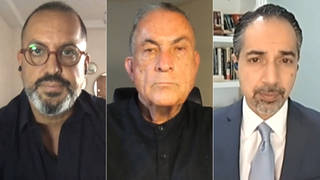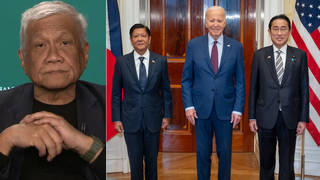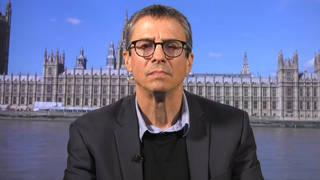
Related
Guests
- Jennifer Turnerpart of the legal team representing Johnson in her application for clemency. She is a human rights researcher with the American Civil Liberties Union, author of the ACLU report titled “A Living Death: Life Without Parole for Nonviolent Offenses.”
President Trump has commuted the life sentence of a woman who was imprisoned for a first-time nonviolent drug offense, after her cause was taken up by reality television star Kim Kardashian West. Alice Marie Johnson, a 63-year-old grandmother from Memphis, was released Wednesday from federal prison in Aliceville, Alabama, where she had been serving her sentence for nearly 22 years. While Alice Marie Johnson has been released, thousands of other prisoners are still serving life without parole for nonviolent drug offenses. We speak with Jennifer Turner, who was part of the legal team representing Johnson in her application for clemency. She is a human rights researcher with the American Civil Liberties Union and author of the ACLU report titled “A Living Death: Life Without Parole for Nonviolent Offenses.”
Transcript
NERMEEN SHAIKH: President Trump has commuted the life sentence of a woman who was imprisoned for a first-time nonviolent drug offense, after her cause was taken up by reality television star Kim Kardashian West. Alice Marie Johnson, a 63-year-old great-grandmother from Memphis, was released Wednesday from federal prison in Aliceville, Alabama, where she had been serving her sentence for nearly 22 years. This is Johnson speaking shortly after her release.
ALICE MARIE JOHNSON: I want to thank President Donald John Trump. Hallelujah! Thank you. Thank you. Thank you. I want to thank Kim Kardashian West. I love you, angel. [inaudible] Thank you. Thank you, Kim. … This is a miracle day. This has been one—the greatest day of my life, the most unexpected thing to happen to me in my life. … I knew I had an attorney call, but I still didn’t know what it was. And when they all came on, then I heard Kim Kardashian’s voice, and she was the one who told me that I was—that it had happened, that I was free, that I was going to rejoin my family.
AMY GOODMAN: Kim Kardashian West met with Trump at the White House last week to advocate for Johnson’s freedom. Kardashian West became an advocate for Johnson after seeing this video produced by Mic.com about Johnson’s case.
ALICE MARIE JOHNSON: After my jury trial, I was sentenced to life in prison. Life offered me no opportunity for parole, because there is no parole in the federal system. … I had been in management for 10 years. When I lost my job, I struggled financially. I couldn’t find a job fast enough to take care of my family. I felt like a failure. I went into a complete panic. And out of desperation, I made one of the worst decisions of my life to make some quick money. I became involved in a drug conspiracy. I missed the birth of my grandchildren, being able to be in their life. I just had a great-grandson. I missed that. Both of my parents have passed away. I was not able to be by either of their sides in their final days. That’s an ache that I can’t—that never goes away.
AMY GOODMAN: While Alice Marie Johnson has been released, thousands of other prisoners are still serving life without parole for nonviolent drug offenses.
For more, we’re joined by Jennifer Turner. She was part of the legal team representing Johnson in her application for clemency, human rights researcher with the American Civil Liberties Union, author of the ACLU report, “A Living Death: Life Without Parole for Nonviolent Offenses.”
Welcome to Democracy Now! It’s great to have you with us, Jennifer.
JENNIFER TURNER: Thank you.
AMY GOODMAN: So, talk about Alice’s case. Talk about how she ended up in jail and now what’s happened.
JENNIFER TURNER: Sure. So, Alice is a great-grandmother, mother of five. And because of circumstances that led her to true desperation, she got involved in a drug conspiracy. She had been laid off from her job, lost her home to foreclosure, was taking care of her five kids without support from her ex-husband, lost her youngest son in a scooter accident, and became involved in a drug conspiracy, basically to support her family. She relayed messages for drug dealers who were moving cocaine from Houston to Memphis, and ultimately was convicted, partly—mostly based on the testimony of co-conspirators, who received reduced sentences, and was sentenced to a mandatory term of life without the possibility of parole. This was her first arrest, her first conviction of any kind. And without clemency from President Trump, she would have died in prison.
NERMEEN SHAIKH: Well, how did you come to represent her in this clemency application? This was not the first time that you attempted to get clemency. You attempted first under the Obama administration.
JENNIFER TURNER: That’s true. I first corresponded with Alice five years ago, when I was researching life without parole for nonviolent offenses. I learned about her case, wrote about her in a report that we published profiling the cases of people serving life without parole for nonviolent offenses.
And she was represented by other counsel in a clemency petition before President Obama, which was denied in the final days of the presidency with no explanation, as is typically the case. I was flabbergasted she was denied. She, to me, seemed like a perfect candidate. She had a pristine disciplinary record, has served a third of her life in prison. And the warden even supported her clemency application.
So, ultimately, I took on her case, more recently, after the Mic.com interview came out and Kim Kardashian expressed interest in getting involved. I said, “Well, let’s try clemency, because that’s really the only way she’s going to get out. And in this case, maybe it could work, under this president,” although it seemed like a real long shot at the beginning.
AMY GOODMAN: And so, Kim Kardashian took her case to the president last week.
JENNIFER TURNER: She did. She traveled to the White House, met with Donald Trump and made her pitch.
AMY GOODMAN: So, if you’re lucky enough to have a celebrity who was on Celebrity Apprentice argue your case before the president… Now, how does it work with the Justice Department? Did this go through the regular channels? And then, of course, how many other people are in Alice’s position?
JENNIFER TURNER: Right. Well, in terms of how this case went through, we submitted a petition to the White House directly. The president has unfettered clemency authority. He could grant mercy to any federal prisoner he wishes to, whose sentence he wishes to reduce.
So, Alice is one of thousands of people who are sitting in federal prison, who have made the best of their time there, who have—really deserve a second chance, who are serving extreme sentences that don’t fit their crimes, who, if given the opportunity to reunite with their families, would live law-abiding lives and be able to contribute to their communities, just like Alice. I’ve seen thousands of cases of people in federal prison who absolutely are deserving of clemency, who similarly should be released and could be released with no harm.
NERMEEN SHAIKH: Well, I want to turn back to Alice Marie Johnson. Speaking yesterday after her release from prison, she spoke about the role that Kardashian West played in her presidential pardon.
KIM KARDASHIAN WEST: I went in, me and Shawn, to really talk to the president about Alice Johnson and really explain to him why she would be such a good person to grant clemency to. I just feel really strongly that she has such a good support system. She has a job waiting for her. She has a home to go to. And she has such a great, supportive family, that just even seeing the work that she’s done while she’s in prison, knowing that she would never get out? … You know, she’s done her time. I mean, she’s done almost 22 years. You know, I think, in life, everyone makes mistakes, and she really deserves a second chance.
NERMEEN SHAIKH: So that was Kim Kardashian West. Now let’s go to Alice Marie Johnson speaking yesterday after her release from prison.
ALICE MARIE JOHNSON: I’ve always called her my angel, but then she turned into war angel, because only war angels never give up. I mean, she has truly been relentless in her fight for me. And to know a woman who has never met me, who has embraced my story and taken me into her heart, not just—this is not a publicity thing for her. Kim told me, when she left that White House meeting, that no matter how this turns out, that she will never stop fighting for me until I come home. So, she’s an incredible woman, an amazing woman.
AMY GOODMAN: So that’s Alice Marie Johnson speaking after her release. So, could you comment on what she said, Jennifer? She was released yesterday, Wednesday evening. Do you know anything of her plans now, what she’s going to do?
JENNIFER TURNER: Yeah, absolutely. So, a caravan of four cars, of all of her family, drove to the prison to pick her up.
AMY GOODMAN: And the prison was?
JENNIFER TURNER: It’s in Aliceville, Alabama, really remote. They drove hours to get there. Alice refused to leave until her family was there, so she could be reunited with them. They drove all the way back to Memphis. She’s going to be living with her brother. She has a very supportive family. She’s one of nine kids. She has six grandkids, a very, very close family. She already has a job lined up. So she’ll be—she’ll be working and reunited with her family immediately. She hasn’t seen her great-grandson yet. And her daughter has newborn twins, who she’s going to meet shortly. So, it’s really just a joyful moment for the whole family.
NERMEEN SHAIKH: And one of the amazing things is that, right after getting out, she’s already been advocating, in interviews, for the thousands of people who are in prison for nonviolent offenses. Let’s just go to a clip of Alice Marie Johnson speaking this morning on The Today Show.
SAVANNAH GUTHRIE: And, Alice, you’ve been very straightforward about the mistakes you made. You were convicted. You spent that time in prison. Now you get a second chance. What do you want to do with that second chance?
ALICE MARIE JOHNSON: Yes. I want to take this chance to try to magnify what has happened with me, so that people will remember that there are other people just like me, who are nonviolent, first-time nonviolent offenders, who pose no safety risk to their communities. So, I can’t just walk away and forget about those who have been left behind.
NERMEEN SHAIKH: So that’s Alice Marie Johnson speaking just this morning. So, could you talk about the people that she’s referring to, the thousands who are in prison for nonviolent offenses?
JENNIFER TURNER: Sure. I mean, over 3,200 people are serving life without parole for the possibility—for nonviolent offenses. If you include whole life sentences, like de facto life, that’s over 17,000 people. In federal prison alone, there are over 1,500 people serving life without the possibility of parole for drug convictions.
AMY GOODMAN: So, let’s go to President Trump earlier this year saying sentencing for drug-related offenses should be much stricter, including the death penalty.
PRESIDENT DONALD TRUMP: The other thing we have to do, in terms of the drug problem, is we have to be very tough on sentences. … These people kill thousands of people over the course of their lives through drugs. So we’re going to have to get much, much tougher in terms of penalty. And if you want to stop it, you look at certain countries, where they have, as an example, the death penalty, and say, “How is your drug problem?” and they will tell you, “We don’t have much of a drug problem.”
AMY GOODMAN: So, that’s President Trump. Talk about that view versus what has happened with Alice. But also, you say thousands of people are behind bars serving life without parole, let alone lower sentences, shorter sentences. This could either be done through the president, but also there’s legislation. Is that right? And what would that look like, if we’re not talking about individual pardons?
JENNIFER TURNER: Sure. I mean, the reality is that the president can’t commute every unjust sentence, and only sentencing—
AMY GOODMAN: Why not?
JENNIFER TURNER: Well, I mean, he could, but that’s not going to fix sentences, going forward. Only sentencing reform is going to fix the sentencing problem we have. And for state prisoners—many of these people are serving life without parole in state prisons, as well—only governors can grant them clemency.
And so, in terms of sentencing reform, there’s a bill up in—a federal bill that could provide some relief to some prisoners. In the states, last year alone, 19 states passed bipartisan sentencing reform legislation, some of which has been really historic, like in Louisiana, that passed a package of bills. So, there needs to be, I would say, industrial-scale clemency to revise sentences for people who are currently incarcerated, because not just nonviolent offenders, people who are incarcerated for violent convictions, as well, certainly have paid their debt to society, have bettered themselves in prison and could be released tomorrow, as well. And we need a system to reunite these people with their families and to their—
AMY GOODMAN: Can you talk about what Senator Booker, Senator Rand Paul—Republican, Democrat, New Jersey, Kentucky—what they’re proposing?
JENNIFER TURNER: Well, currently, the Sentencing Reform and Corrections Act, that’s been proposed by Dick Durbin and Grassley, that’s being reviewed by Congress right now. That would provide some relief to some federal prisoners serving life without parole for nonviolent drug convictions. Another bill, the First Step Act, would not provide assistance to—people like Alice would never have gotten a sentence reduction through that. So, what we really need is comprehensive sentencing reform that’s retroactive, that will help the thousands of people who are currently behind bars.
AMY GOODMAN: A final question, about racial disparities between—around people’s sentences and who’s behind bars and who isn’t.
JENNIFER TURNER: Absolutely. In terms of life without parole for nonviolent offenses, we found that about 65 percent of the people serving those sentences are black. When you consider life sentences overall, almost half are black. So there are staggering racial disparities in who’s getting these extreme punishments that don’t fit the crimes.
AMY GOODMAN: Well, Jennifer Turner, we want to thank you very much, part of the legal team representing Alice Marie Johnson in her application for clemency. Jennifer is a human rights researcher with the American Civil Liberties Union, author of the ACLU report, which we will link to at democracynow.org, “A Living Death: Life Without Parole for Nonviolent Offenses.”
When we come back, we go south to Nicaragua. More than a hundred protesters have been killed under the government of Sandinista Daniel Ortega. What’s happening?












Media Options